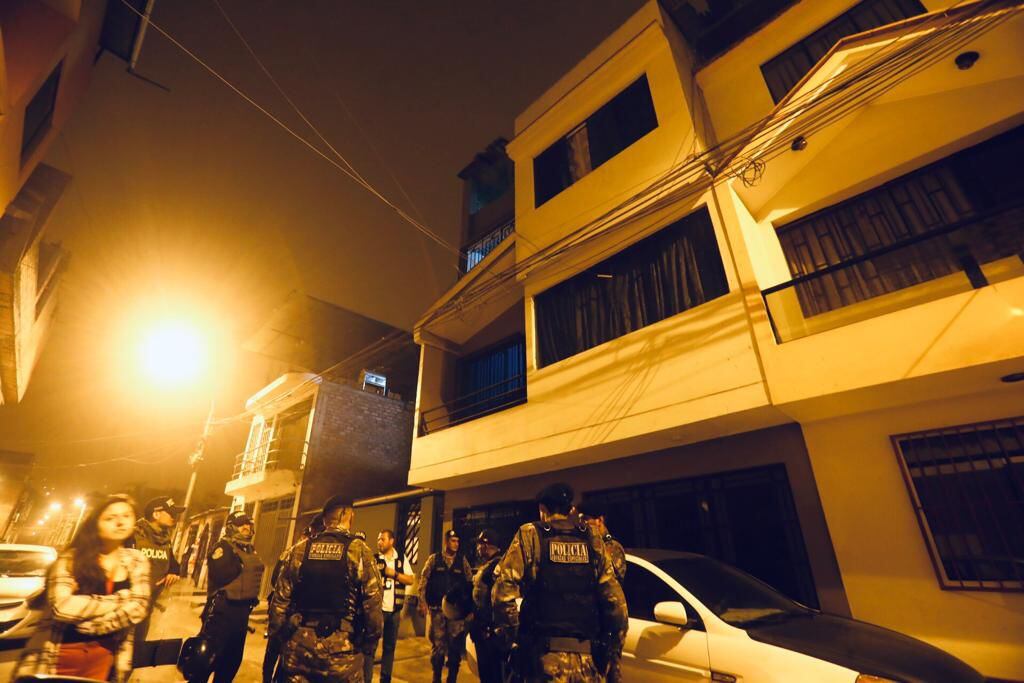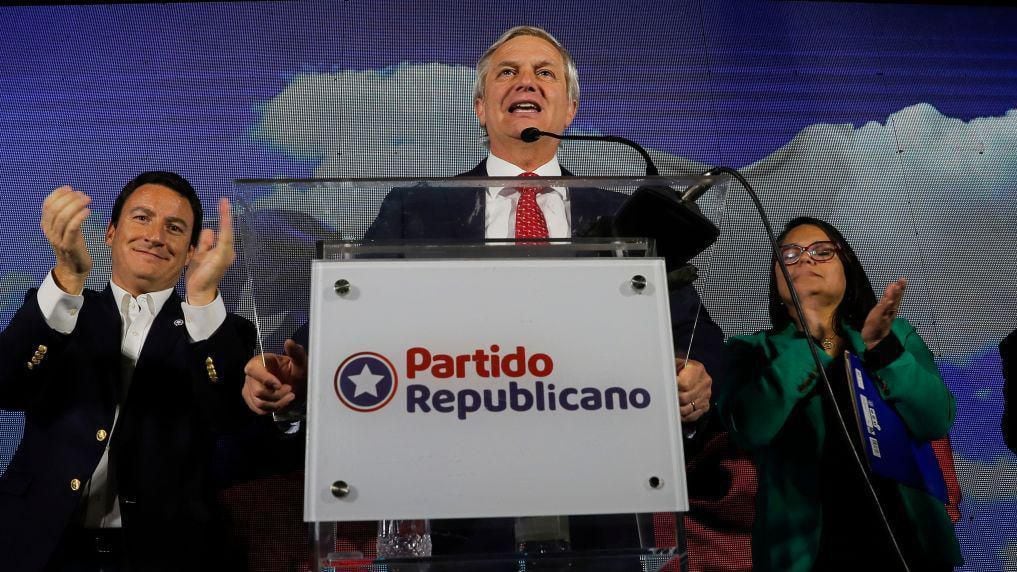Former Chilean candidate and founder of his country’s Republican Party José Antonio Kast He was in Lima this week carrying out activities as president of the Rede Política por Valores platform, participating in meetings with Peruvian politicians and giving a conference in Congress.
TO LOOK: “Now an Israeli intervention in Gaza will begin and there will be much more violence”
—It seems that for a political sector there is no right or left, but only the extreme right. How do you see this desire to put labels on everything?
The left always uses violence with great force, not only physical and verbal, but also digital, seeking to caricature people, but it has a fundamental error. If they say that someone is ultra, in my case they are saying that 44% of the people who voted for me in the second round would have some degree of ultra, or that the 35% of Chileans who voted for republican councilors could be assimilated to this concept, which which is not true. Given this, we say: extreme in what way? In loving the country? In defending the family? Looking for a quality education? Therefore, it remained just a caricature used by very radical sectors of the left.
—For you, are they the ultras?
No. They are people who live on conflict, on the radical, incapable of seeing the good things in life. We can recognize things that leftist governments have done, but they are not capable of objectively evaluating things. And conservative? I believe that good things should be preserved and bad things should be corrected. This is progress, and within progress is the defense of the weakest: the elderly, people yet to be born. If we believe in the advancement of society, we will take care of the weakest.
—Do you think there is a revival of conservatism? They incorporated into the Chilean constitutional text the right to life of those who have not yet been born.
We very strongly install the concept that the person is at the center, that the family is the nucleus of society and that the State is at the service of the person. What we do is maintain the concept that was already in our Constitution, which said that the law protects the life of the unborn child. We also reinforced the concept of maternity care and proposed that any child after 85 days has the right to be cared for in a state-funded daycare center.
—You have been very critical of what you call the “shy right” and claim that Piñera handed over power to the left twice. Do you think that the weakness of right-wing governments created the conditions for the emergence of the left in the region?
There are governments that call themselves right-wing that do not dare to govern with their own ideas and say: “I will manage, but I will also take some left-wing flags to become more popular”. The left destroys the economy and then the right shows up to fix everything for a while, and then goes back to the left to ruin what was done again. Former presidents Duque [Colombia]Piñera [Chile] and Macri [Argentina] They fell into the temptation of believing that by giving to the administration, what they lacked was popularity.
—Do you think this is the moment for the right in the region? How would you receive a victory for Milei in Argentina?
Argentina has experienced accelerated deterioration since several left-wing governments. Without interfering in Argentina’s destiny, I hope everything goes very well for Javier Milei. Argentina is a strong and powerful nation captured by bad politicians. Therefore, many Argentine citizens see this situation as the last opportunity to make a radical change and face this giant state, rampant corruption and insecurity. We would be happy if Milei did well in the next elections.
—Peru and Chile opened their doors to Venezuelans fleeing the Maduro dictatorship. However, organized crime has also joined gangs such as Trem de Aragua. How would your government deal with this issue?
We have to distinguish that migration in itself is not bad, the problem is irregular and illegal migration. We are grateful to immigrants who practice the medical profession. Our healthcare system could not function in primary care if we did not have foreign doctors. What we demand is that anyone entering the country identifies themselves, that they enter through the door and not through the window. Furthermore, totalitarian regimes or narco-dictatorships like Maduro’s are not in conflict with the international community. We have Venezuela installed in the OAS or the UN, receiving recognition even from the president of our nation, saying that the blockades must end. The international community has to do something.

—There is an increase in the perception of insecurity among Chilean citizens, despite the fact that, compared to other countries in the region, they are in a better position. How do you evaluate this?
The most present social urgency among citizens is security. Former president Piñera proposed the reformulation of police forces in Chile, which was going backwards, because if there is an orderly and efficient police force, it is the Chilean one. We propose, at a constitutional level, to give the victim the same rights as the criminal. We have a criminal system that provides a lawyer for the criminal, but not for the victim. Furthermore, we emphasize that anyone who enters illegally will be expelled in the shortest possible time. We also seek to create a supra-territorial court to avoid threats to judges from mafias or organized crime.
—How do you explain that Chile went from being the star of South America to a country in crisis?
There is a moral crisis affecting the public service. Corruption does not allow a society to move forward. And regarding the crisis, which was a citizen unrest that continues and must be dealt with with good laws, it must be said that it was the left-wing governments that generated the greatest unrest, with irrational tax increases, with the opening of borders to unregulated migration and with a high degree of corruption, and this ends up irritating citizens who have the legitimate right to demonstrate against a radical left that focuses all our energy on someone responsible, which in this case was the Constitution dictated by a military government, and which – according to them – which is why it did not meet democratic parameters, forgetting that it had been carried out in a plebiscite in 1989 and that numerous modifications had been made to it, all approved in Congress and ratified by several presidents.
—How do you evaluate relations between Chile and Peru and how do you imagine them in your hypothetical government?
I imagine them very well and I regret that they do not exist today. I regret the expressions that our president made regarding the Peruvian president. It is not up to a neighboring authority to express itself in this way. I am pleased that he has apologized for his comments at the UN and that he recognizes that we must work together. We are border countries and have a huge projection towards Asia-Pacific that requires us to be more united than ever. We have very similar climatic, mining and agricultural conditions that can improve us. It’s not just a competition to see who wins the market; There is enough market, we all empower each other, not necessarily doing the same thing. Today I do not see relations that bring advantages to either of our two countries.
—There was a change of chancellor in your country…
This will help. In Chile we have a chancellor with experience [Alberto van Klaveren]which benefits relations, but our president is still responsible for how he interacted with the president [Pedro Castillo] who committed a self-attack. Boric received the former Peruvian president at a time before his dismissal and then did not accept the democratic rules of a neighboring country. He had no reason to intervene in a local situation.
—It was an ideological question.
Exactly. Until this ideological prejudice is overcome, it will be difficult to strengthen relations between the two nations.

—It’s only been 50 years since Pinochet’s coup d’état. Do you think you missed the opportunity to reconcile your country?
President Boric missed a great opportunity. He could have done something different. We look to the next 50 years. Countries have to heal their wounds and authorities have to exercise leadership, and in this Boric did not exercise it, but we saw how he repeatedly remembers a president who had bad management and led Chile to an institutional crisis like Salvador Allende .
—He does not recognize the mistakes and crimes that Allende also committed…
When you look at history you have to analyze it objectively. When a president is declared outlaw by Congress, when the Judiciary declares that he is outlawed, when the Comptroller determines that he is not fulfilling his role, when there are three State institutions that say that the president has violated everything related to Democracy, well, you can’t lose that.
—And on the other side we have the figure of Pinochet, who is recognized for his economic achievements, but who was also not a saint.
Nobody here claims critical situations of violation of people’s rights. You cannot put yourself in the situation that everything you did was good or bad. It is necessary to objectively analyze the presidential period. We can say that Chile has grown and that people who committed crimes are now serving their sentences.
—There are those who have their own narrative.
The left always tries to rewrite history according to its own script. But history always returns to its place.
THE NEW PLEBISCITE
“The left must be defeated at the polls”
—You stated that the person and values must be the center of your country’s draft Constitution…
It’s common sense. The State is built on the person, it has to be at his service and not the other way around. We have seen in several left-wing governments that first install the State, to which tributes must be paid. We say no.
—Will the president of your country be an obstacle to the adoption of this Constitution?
Let’s hope not. Citizens elected Gabriel Boric based on voluntary voting. Today we have mandatory voting, and when people already have the obligation, they express themselves according to what their life and environment are like, security, education, health, housing, and they realize that when a State is Too big, it begins to absorb all resources and there is nothing left to resolve social emergencies. The president was decisively defeated on September 4, 2022 [plebiscito del primer proyecto de Constitución]and we triumph on May 7th [elección de integrantes del Consejo Constitucional para elaborar nueva propuesta] with 35% support from citizens, because we showed that whoever said that the State would solve all problems, when they came to government, forgot about the people.
—About the December plebiscite, you said: “We have an unbeatable opportunity to change the future of Chile.” Do you remain optimistic?
Ever. We show and warn about the approach to refounding Chile led by President Boric, which was rejected by a large majority. After that, we didn’t want a second process. But once it became law we decided to enter because we need to work from the inside and not from the outside with a megaphone insulting those inside. The left must be defeated at the polls, democratically. The citizen demonstration of not wanting a refoundation and the success we had on May 7th make us appear optimistic, despite today’s polls may say otherwise.
Source: Elcomercio
I am Jack Morton and I work in 24 News Recorder. I mostly cover world news and I have also authored 24 news recorder. I find this work highly interesting and it allows me to keep up with current events happening around the world.

:quality(75)/cloudfront-us-east-1.images.arcpublishing.com/elcomercio/Y3H7SXKE6FAVJOXVEWFN5BDBBM.jpg)

:quality(75)/cloudfront-us-east-1.images.arcpublishing.com/elcomercio/2UP6FWTLXZGZPK7BJBIDFPYQ4E.png)
:quality(75)/cloudfront-us-east-1.images.arcpublishing.com/elcomercio/HXLOF23M4NGWBLNR44ZHUQ4YZM.jpg)


